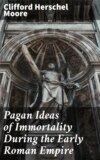Volume 35 pages
Pagan Ideas of Immortality During the Early Roman Empire
About the book
In «Pagan Ideas of Immortality During the Early Roman Empire,» Clifford Herschel Moore meticulously examines the intricate tapestry of beliefs surrounding life after death in the ancient world. Employing a scholarly approach, Moore delves into a rich array of sources, including philosophical texts, religious doctrines, and cultural practices, to illustrate how Roman paganism grappled with notions of immortality. His literary style is marked by clarity and precision, making complex theories accessible while maintaining academic rigor. Contextually, this work situates itself within broader debates on the influence of Greco-Roman thought on later Christian ideologies, providing a timely historical analysis of a period marked by cultural exchange and transformation. Clifford Herschel Moore was a prominent scholar of classical studies, whose extensive work in ancient philosophy and religion laid the groundwork for this profound exploration. His intellectual background, coupled with his keen interest in how ideas evolve across different cultures and time periods, undoubtedly influenced his examination of pagan beliefs. Moore's erudition reflects both his reverence for ancient texts and a desire to illuminate how these beliefs shaped human understanding of existence and transcendence. For anyone intrigued by the intersections of religion, philosophy, and history, Moore's book is essential reading. It invites reflection on the enduring questions of mortality that resonate throughout human experience, making it a significant contribution to both classical studies and contemporary discussions about life, death, and what may lie beyond.










